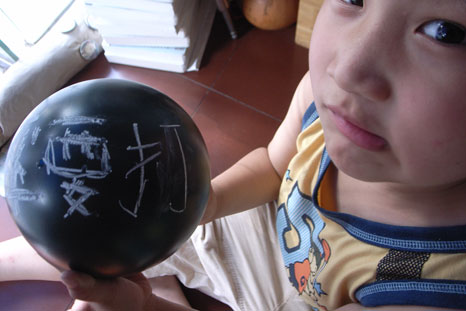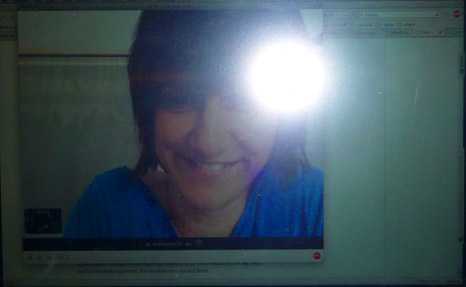
啦啦啦啦,家作坊祝大家中秋节快乐!My ma always told me no mooncake face, but hey now, just wishing everyone a happy Mid-Autumn Festival~

啦啦啦啦,家作坊祝大家中秋节快乐!My ma always told me no mooncake face, but hey now, just wishing everyone a happy Mid-Autumn Festival~
 时间 posted on: 23 September 2010 |
时间 posted on: 23 September 2010 |  发布者 author: e |
发布者 author: e |  评论 comment (0) |
评论 comment (0) |
 “有种”练习第四:“有种”儿童电影节
“有种”练习第四:“有种”儿童电影节—-
张硕,天天和Woody是家作坊的卓越遴选委员会。从五布“有种”的片子他们最后选了《少林足球》。
With a distinguished jury comprised of Bobby, Woody and Tiantian, HomeShop’s movie night gives due respect to the film Shaolin Soccer, which actually came in second runner-up to a Japanese animé called A Brave Boy, but was inaccessible due to the lack of Chinese language dubbing. Other short-listed BALLSY films: BBC’s Planet Earth, Sky Captain and the World of Tomorrow and Yasujirô Ozu’s I Was Born, But…

 时间 posted on: 2 August 2010 |
时间 posted on: 2 August 2010 |  发布者 author: e |
发布者 author: e |  评论 comment (0) |
评论 comment (0) |

re-jigging around the interruption. a compelling incompleteness. this must be the place.
When you start in-between, what you’re in the middle of is a region of relation. Occurrent relation, because it’s all about event. Putting the terms together, you realize straight away that the relational event will play out differently every time. In repeating, it takes up the past differently. In taking up the past differently, it creates new potentials for the future. The region of occurrent relation is a point of potentiation. It is where things begin anew. Where things begin anew is where they were already present in tendency.
JM: Then what precedes the event? What gives rise to it?
BM: Shock. That’s what Peirce says. Affect for me is inseparable from the concept of shock. It doesn’t have to be a drama. It’s really more about microshocks, the kind that populate every moment of our lives. For example a change in focus, or a rustle at the periphery of vision that draws the gaze toward it. In every shift of attention, there is an interruption, a momentary cut in the mode of onward deployment of life. The cut can pass unnoticed, striking imperceptibly, with only its effects entering conscious awareness as they unroll. This is the onset of the activation I was referring to earlier. I’d go so far as to say that this onset of experience is by nature imperceptible.
This is one way of understanding “microperception,” a concept of great importance to Deleuze and Guattari. Microperception is not smaller perception; it’s a perception of a qualitatively different kind. It’s something that is felt without registering consciously. It registers only in its effects. According to this notion of shock, there is always a commotion under way, a “something doing” as James would say. There is always a something-doing cutting in, interrupting whatever continuities are in progress. For things to continue, they have to re-continue. They have to re-jig around the interruption. At the instant of re-jigging, the body braces for what will come. It in-braces, in the sense that it returns to its potential for more of life to come, and that potential is immanent to its own arising.
It might not sound political, at least in the way it’s usually meant. But it is, because the virtuality is of an event to come, and as we saw before the event always has the potential to affectively attune a multiplicity of bodies to its happening, differentially. Aesthetic politics brings the collectivity of shared events to the fore, as differential, a multiple bodily potential for what might come. Difference is built into this account. Affective politics, understood as aesthetic politics, is dissensual, in the sense that it holds contrasting alternatives together without immediately demanding that one alternative eventuates and the others evaporate. It makes thought-felt different capacities for existence, different life potentials, different forms of life, without immediately imposing a choice between them. The political question, then, is not how to find a resolution. It’s not how to impose a solution. It’s how to keep the intensity in what comes next. The only way is through actual differentiation. Different lines of unfolding bring the contrast into actuality, between them. The political question is then what Isabelle Stengers calls an “ecology of practices.” How do you tend this proliferation of differentiation? How can the lines not clash and destroy each other? How do they live together? The “solution” is not to resolve the tension through a choice, but to modulate it into a symbiosis: a cross-fertilization of capacitations that live out to the fullest the intensity of the event of their coming together.
There’s a certain incompleteness to any micropolitical event, like the events I was talking about. A lot of things that you feel were on the verge of taking shape didn’t quite happen. Potentials that you could just glimpse didn’t come into focus. The goal is not to overcome the incompleteness. It’s to make it compelling. Compelling enough that you are moved to do it again, differently, bringing out another set of potentials, some more formed and focused, others that were clearly expressed before now backgrounded. That creates a small, moveable environment of potential. The goal is to live in that moveable environment of potential. If you manage to, you will avoid the paralysis of hopelessness. Neither hope nor hopelessness—a pragmatics of potential. You have to live it at every level. In the way you relate to your partner, and even your cat. The way you teach a class if you’re a professor. The way you create and present your art if you’re an artist. If you participate in more punctual events like the ones I was describing, this will provide a continuous background for what comes of those events to disseminate into and diffuse through. A symbiosis of the special event and the day-to-day, in creative connivance.
Micropolitics is not programmatic. It doesn’t construct and impose global solutions. But it would be naïve to think that is separate from that kind of macro-activity. Anything that augments powers of existence creates conditions for micropolitical flourishings. No body flourishes without enough food and without health care. Micropolitical interventions need macro solutions. But success at the macropolitical level is at best partial without a complementary micropolitical flourishing. Without it, the tendency is toward standardization. Since macropolitical solutions are generally applicable by definition, by definition they act to curtail the variety and exuberance of forms of life. Macropolitical intervention targets minimal conditions of survival. Micropolitics complements that by fostering an excess of conditions of emergence. That inventiveness is where new solutions start to crystallize. The potentials produced at the micropolitical level feed up, climbing the slope that macropolitics descends. Micropolitical and macropolitical go together. One is never without the other. They are processual reciprocals. They aliment each other. At their best, they are mutually corrective.
It has become a commonplace recently to say that we are in a situation where the end of the world is now imaginable—but the end of capitalism isn’t. That is definitely one “solution” that is not likely to come programmatically, top-down— given who’s on top. The dismantling of capitalism is a “corrective” that will only come from a breaking of the reciprocity I was just talking about between the macro- and micropolitical. The prevailing operating conditions of macro/micropolitical reciprocity should not be taken to imply that the symmetry is never broken, that a bifurcation can never occur. The complementarity can be broken in both directions. When macrostructures miniaturize themselves and work to usurp the ground of the micropolitical with scaled-down versions of the dominant generalities, that is fascism. When micropolitical flourishings proliferate to produce a singularity, in the sense of a systemic tipping point, that’s revolution. The ultimate vocation of micropolitics is this: enacting the unimaginable. The symmetry-breaking point, the point at which the unimaginable eventuates, is but a cut, “smaller” than the smallest historically perceivable interval. That is to say, qualitatively different. A moment of a different color, one you never see coming, that comes when it’s least expected. Inevitably, a next micro/macro complementarity will quickly settle in. But it will take a form that could not have been predicted, but is now suddenly doable and thinkable. Micropolitics is what makes the unimaginable practicable. It’s the potential that makes possible.
–Brian Massumi, Of Microperception and Micropolitics
 时间 posted on: 8 July 2010 |
时间 posted on: 8 July 2010 |  发布者 author: f |
发布者 author: f |  comments (2) |
comments (2) |

17 June 2009.
Zhang Shuo (a.k.a. Bobby) comes over asking to meet with his “foreign friend”. Oh! Could our little experiments in “cultural exchange” be working? HomeShop arranges a second live web chat between Mr. Bobby in Beijing and Fotini at our Berlin end of things. After playing the naming game again (“香蕉 banana”, “酱油 soy sauce”, “iPod”, and a few things that we didn’t know how to say), Bobby——feeling more and more comfortable with his new friends——decides that he’s had enough of “cultural exchange” and simply decides to play exhibitionist instead. “Take my picture!”
“Again!“
 时间 posted on: 21 June 2009 |
时间 posted on: 21 June 2009 |  发布者 author: e |
发布者 author: e |  评论 comment (0) |
评论 comment (0) |